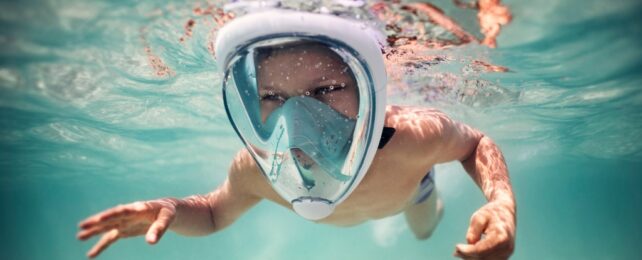When Sally Standley arrived in the Seychelles with her family and friends, she looked forward to soaking up the Sun and snorkeling in the clear blue water of the Indian Ocean, rich in beautiful tropical fish.
The fit, healthy 59-year-old had snorkeled before, but this was the first time she'd used a full-face mask.
One day when she was out snorkeling, about a week into the holiday, her vision suddenly went blurry.
"And then I was thinking, hang on, I can't breathe, I had no energy at all," she told Insider. "I could see a buoy about two meters away from me, and I thought I cannot swim that far. I rolled onto my back and used my fins to propel me."
"I can remember thinking I have one chance to turn over because that's all the energy I've got. I'm going to drown," she said.
Standley reached the buoy and grabbed onto it for dear life. By the time Standley's friend's husband reached her, she was unconscious.
She was navy blue and was frothing black foam from her mouth, she told Insider. An ambulance was called, and she was given oxygen until the paramedics arrived.
"They took me to the emergency room, and I spent three days in a coma," Standley said. "My husband was told the most likely outcome was persistent vegetative state because I've been oxygen-deprived – or brain damage, lung failure, and kidney failure."
After a last-hope dose of fentanyl and adrenaline, Standley said her blood pressure came back up.
"And I have no ill effects. I'm so very lucky."
While it may sound like a freak accident, Standley's narrow escape may indicate a more serious issue involving full-face snorkel masks.
Dead space in the mask
Although doctors have been unable to confirm what caused her condition, the design of the snorkels has been linked to several deaths worldwide.
British woman Angela Kearn, 63, died while snorkeling in the Red Sea in Egypt after she used a full-face mask from a Decathlon sporting goods store.
A coroner found the cause of death to be immersion pulmonary edema, where fluid builds up in the lungs, and hypertension and menopause that was treated by hormone replacement therapy.
But Caroline Topping, the coroner, also wrote: "The use of a full face snorkel mask contributed to the death in two ways."
She said that "negative pressure in the lungs is increased as a result of the increased effort of breathing caused by inhalation through the snorkel tube and mask" and that her breathing was made harder "by the inhalation of elevated carbon dioxide levels caused by inhaling air drawn through a dead space in the mask".
In her report, Topping raised her concerns about the masks.
"The concern is that many millions of the full face masks have been sold and the safety concerns about their use by those with ongoing cardiovascular and respiratory issues has not been widely publicized or brought to the attention of those who already own the masks," she wrote.
She added that before 2017, the Decathlon masks did not warn about these issues. It has since updated this to warn people with asthma, hypertension, chest infections, heart disease, or angina not to use the masks.
In a statement to Insider, a Decathlon spokesperson said: "This is a tragic case. Customer safety is our number one priority, and we will, of course, be responding to the coroner."
"We have always worked with expert independent bodies to devise tests. We are currently in discussions over the possibilities of testing a larger population and expanding the age group within accepted Health and Safety parameters."
Why are they so dangerous?
Dr. Philip Foti, a pulmonologist in Hawaii and principal investigator of the Snorkel Safety Study, told Insider that it's the difficulty of removing the masks that makes them so dangerous.
"We're working on a case right now where someone died here in Hawaii because she could not call out and get help from surrounding snorkelers. So one of the problems is you can't extract yourself from the gear rapidly, particularly if your motor function is impaired," Foti said.
But scientists in Hawaii have struggled to conclude whether these face masks are dangerous, due mainly to a lack of data.
According to the Snorkel Safety Study, in 112 snorkeling-related drownings in Hawaii from 2014 to 2018, only 16 percent of the incidents had information on the type of mask worn.
Despite this, Foti said that, in his opinion, "using a full-face mask in the fashion they have been designed will always be way too high risk".
This article was originally published by Business Insider.
More from Business Insider: